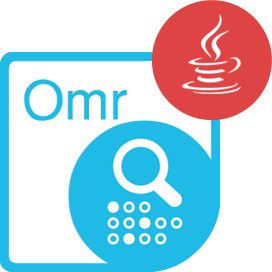<dependency>
<groupId>com.aspose</groupId>
<artifactId>aspose-omr-cloud</artifactId>
<version>18.8.0</version>
</dependency>compile(group: 'com.aspose', name: 'aspose-omr-cloud', version: '18.8.0')<dependency org="com.aspose" name="aspose-omr-cloud" rev="18.8.0">
<artifact name="aspose-omr-cloud" ext="jar"/>
</dependency>libraryDependencies += "com.aspose" % "aspose-omr-cloud" % "18.8.0"Java REST API for OMR Processing in the Cloud
Product Page | Documentation | Live Demo | Swagger UI | Code Samples | Blog | Free Support | Free Trial
Aspose.OMR Cloud SDK for Java is a wrapper around Aspose.OMR Cloud APIs. This SDK enables your Java Apps to perform optical mark recognition (OMR) operations on questionnaires, exams, MCQs, surveys, and other OMR sheets.
You can define your own templates and rules, detect the required data from the OMR digital sheets, perform grading of the extracted data and export it to the CSV format. No need to install any 3rd party software.
Mark-up for the template generation supports several types of elements, such as, text, choice-box (question), multi-column answer sheet, grid, images, QR-code and Aruco code types of barcodes.
OMR Cloud Processing Features
- Perform recognition of scanned photos and images for OMR operations.
- Ability to perform OMR on rotated & perspective (within 25 deg) photos.
- Extract & recognize human-marked data from scanned tests, exams, surveys, etc.
- Supports the export of OMR results to CSV file format.
- Use textual markup to generate OMR templates, generate surveys, and test sheets.
- Availability of GUI application for managing OMR templates.
- Specify the number of OMR based questions & answers in the template.
- Availability of GUI OMR editor as a cloud client.
- Provide JSON rules to perform OMR answer grading.
- Clip an area of interest from an image, save it as JPEG & perform OMR on it.
- Perform highly accurate optical mark recognition (OMR).
- Supports several configuration presets for image preprocessing.
OMR Cloud Storage Features
- Upload, download, copy, move and delete files, including versions handling (if you are using Cloud storage that supports this feature - true by default).
- Create, copy, move and delete folders.
- Copy and move files and folders accross separate storages in scope of a single operation.
- Check if certain file, folder or storage exists.
Save OMR As
CSV
Read OMR Formats
JPEG, PNG, GIF, TIFF, BMP
Requirements
Building the API client library requires:
- Java 1.7+
- Maven
Prerequisites
To use Aspose.OMR Cloud SDK for Java you need to register an account with Aspose Cloud and lookup/create Client ID and Client Secret at Cloud Dashboard. There is free quota available. For more details, see Aspose Cloud Pricing.
Installation
Install from Maven
Add Aspose Cloud repository to your application pom.xml
<repository>
<id>aspose-cloud</id>
<name>Aspose Cloud Repository</name>
<url>https://releases.aspose.cloud/java/repo/</url>
</repository>
Install from source
To install the API client library to your local Maven repository, simply execute:
mvn clean install
To deploy it to a remote Maven repository instead, configure the settings of the repository and execute:
mvn clean deploy
Refer to the OSSRH Guide for more information.
Maven users
Add this dependency to your project’s POM:
<dependency>
<groupId>com.aspose</groupId>
<artifactId>aspose-omr-cloud</artifactId>
<version>18.8.0</version>
<scope>compile</scope>
</dependency>
Others
At first generate the JAR by executing:
mvn clean package
Then manually install the following JARs:
target/aspose-omr-cloud-18.8.0.jartarget/lib/*.jar
EXAMPLE
OMRFunctionParam param = new OMRFunctionParam();
String packedTemplate = PackTemplate(templateFile.getFileName().toString(), Files.readAllBytes(templateFile));
param.setFunctionParam(packedTemplate);
UploadFile(imageFile, "");
return api.postRunOmrTask(imageFile.getFileName().toString(), "CorrectTemplate", param, null, null);
Licensing
All Aspose.OMR Cloud SDKs, helper scripts and templates are licensed under MIT License.
Authorization & Authentication
Authentication schemes defined for the API is as follows:
JWT
- Type: OAuth
- Flow: application
- Authorization URL: https://api.aspose.cloud/connect/token
Recommendation
It’s recommended to create an instance of ApiClient per thread in a multithreaded environment to avoid any potential issues.
Product Page | Documentation | Live Demo | Swagger UI | Code Samples | Blog | Free Support | Free Trial
| File | Classifier | Size |
|---|---|---|
| aspose-omr-cloud-18.8.0.jar | 70.65 KB | |
| aspose-omr-cloud-18.8.0.pom | 7.20 KB |
Aspose.OMR Aspose.OMR Cloud Aspose Java REST API Maven SDK Java SDK Cloud REST REST API Cloud API MIT JWT oauth Aspose.Total Cloud JPEG PNG BMP TIFF PDF CSV OMR scan detect identify detection human marked data sheet survey MCQ questionnaire template text choice box answer sheet grid logo images barcode QR code Aruco code perspective test answer markup

